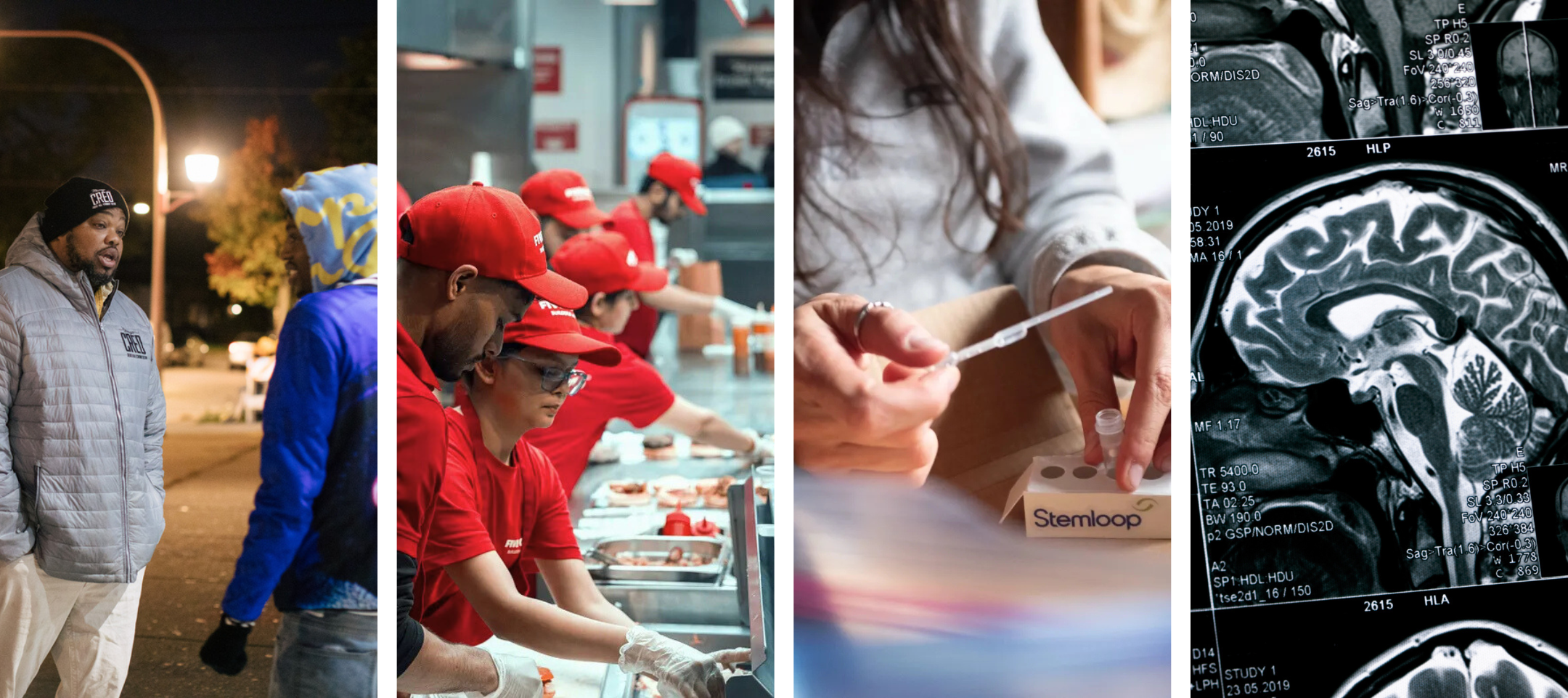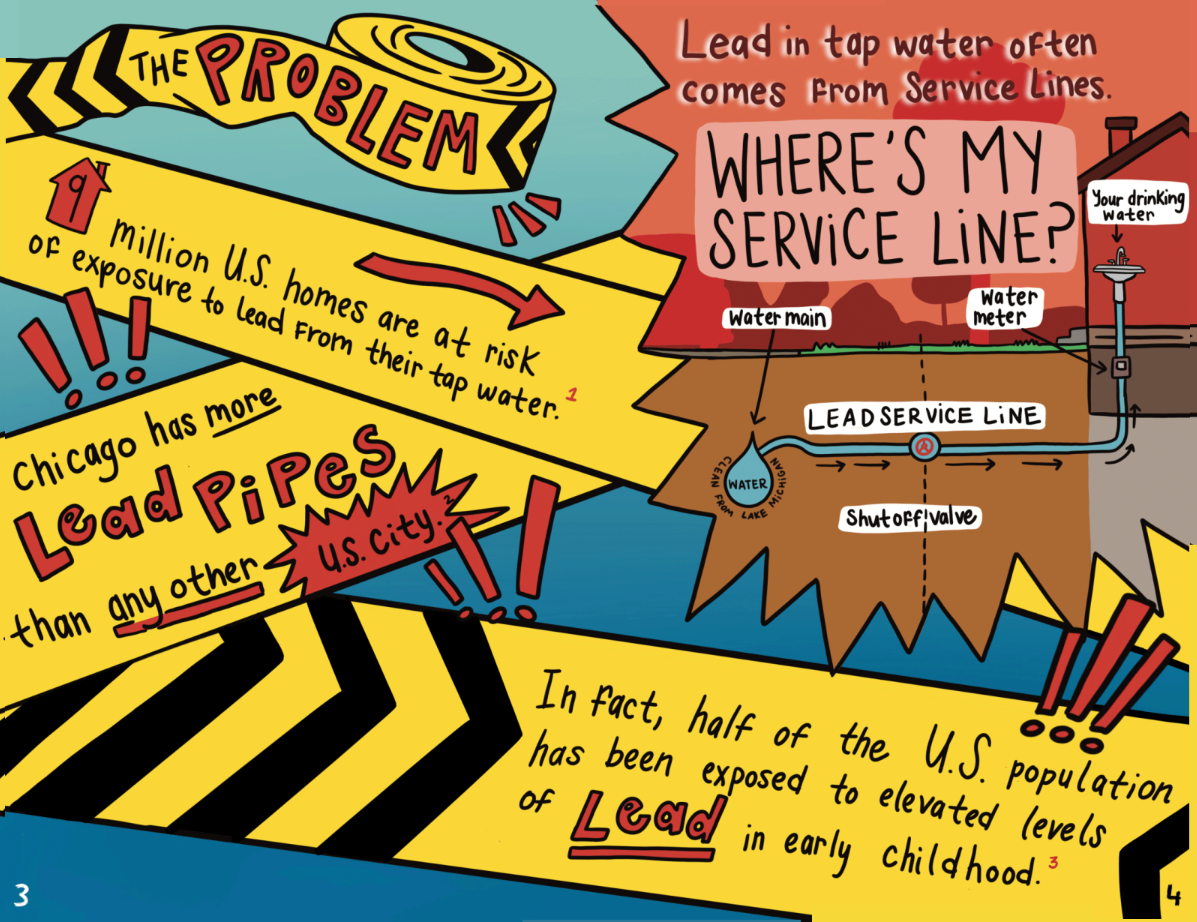IPR Faculty Tackle Big Problems with Bold Research
In statehouses, courtrooms, city halls, and beyond, IPR experts ensure evidence guides policy decisions
Get all our news
Our work is about more than producing high-quality research. It’s about connecting that research to the people who can use it to build safer, healthier, and fairer communities.”
Andrew Papachristos
IPR director and sociologist

IPR experts are making an impact in community violence prevention, labor rights, clean drinking water access, neuroscience-based sentencing reform, and more.
Earlier this year, IPR neuroscientist Katie Insel appeared before Washington state lawmakers to make a case grounded in science: The human brain is not done developing at age 18, and sentencing laws should reflect that. Insel drew on years of research to support a bill expanding parole eligibility for young adults convicted of serious crimes before age 21.
It was a moment that exemplified IPR’s mission—connecting rigorous research with real-world change. Across fields and issues, IPR faculty are helping shape policy through testimony, tools, partnerships, and data that illuminate the path to more just and effective solutions.
Making Sentencing Fairer for Adolescents
While Americans can vote and join the military at age 18, this age “is not necessarily a logical cut point or threshold for adulthood,” Insel said.
Brain scans show that gray matter thinning and other changes associated with judgment generally continue into one’s mid-20s, sometimes as late as age 30. Behavioral data reveal that sensation-seeking tends to peak around age 19 or 20.
“We know developmentally, in terms of behavior and brain outcomes, that the brain is continuing to change throughout the adolescent years in ways that are really important for how teens make decisions, how they engage in self-control, and how they regulate their emotions over time,” Insel explained at an IPR colloquium in May.
Working in partnership with developmental scientists, legal scholars, and advocates, Insel helps translate brain science into legal reform. She contributes her expertise to amicus briefs, writes white papers, and collaborates with legal professionals to improve their understanding of how the adolescent brain develops.
While the Washington state bill stalled in committee, Insel’s work has helped drive policy changes elsewhere. In Michigan, a series of reforms Insel supported included a 2025 state Supreme Court ruling prohibiting automatic life without parole (LWOP) sentences for certain crimes for people under 21. Massachusetts now bans all LWOP sentences for those under 21.
Her attention is now on California’s Senate Bill 672, which would allow individuals who were 25 or younger when they committed a crime to receive a parole hearing after serving 25 years. If passed, it would mark another step in aligning sentencing laws with science—and in recognizing that brain development does not stop at age 18.
Exposing Millions in Wage Theft
In and around Los Angeles, fast-food workers lose more than $44 million each year to minimum wage violations—the failure of employers to pay their workers the statutory minimum wage.
IPR political scientist Daniel Galvin, director of the Workplace Justice Lab @ Northwestern, co-authored a report quantifying these losses. The study found that between 2019 and 2024, 19% of fast-food workers were affected annually, with this number rising to 25% by 2024.
These workers lost about 16% of their income—roughly $3,500 per year—to minimum wage violations, a devastating hit for those already struggling to make ends meet.
“When low-wage workers are underpaid by even a small percentage of their income, they face major hardships such as being unable to pay for rent, afford childcare, or put food on the table,” Galvin said.
Another study co-authored by Galvin highlights the shrinking enforcement workforce at the U.S. Department of Labor. There are just 611 investigators nationwide: one for every 278,350 employees. With fewer resources to enforce labor laws, Galvin points to worker education programs—now under consideration by the L.A. City Council—as a promising strategy to reduce violations and empower workers.
Forging New Tools to Fight Water Insecurity

Lucks and Young's team produced a zine to explain how lead enters
local tap water and what residents can do about it.
A 2018 investigation found nearly 70% of tested homes in Chicago had lead in their tap water. Lead is a neurotoxin, and exposure to it can cause serious health issues, particularly in children.
To help residents monitor water quality, IPR faculty Julius Lucks, a synthetic biologist, and Sera Young, an anthropologist, developed a handheld test kit that people can use to detect lead in drinking water in their own homes with a single drop. Currently being piloted across the region, the kit offers a low-cost, accessible alternative to municipal testing. They plan to make future versions that test for copper and PFAS, also known as “forever chemicals,” too.
Globally, Young and her team created the WISE (Water InSecurity Experiences) Scales, a 12-question survey that captures not only physical access, but also the emotional experience of water insecurity. Prior to the creation of the WISE Scales, there was no cross-culturally tested tool for measuring water insecurity—or even a universal definition of water insecurity.
“Our goal is to make the most vulnerable of us more water secure,” Young said. “And to do that, we have to make these invisible problems visible.”
Since 2019, more than 100 organizations across 80 countries have adopted the tool, including Gallup, the World Bank, and the U.N.’s Food and Agriculture Organization. By combining infrastructure data with lived experience, Young’s work helps policymakers design more responsive, humane solutions.
Putting Safety in Community Hands
Gun violence remains one of the most urgent challenges facing U.S. cities, but evidence shows that community-led interventions can be remarkably effective.
At the Center for Neighborhood Engaged Research and Science (CORNERS), Executive Director and IPR research professor Soledad Adrianzén McGrath and IPR Director and sociologist Andrew Papachristos study programs that rely on trusted local community leaders to prevent violence.
Their research on the Chicago Create Real Economic Destiny (CRED) program found participants were less likely to commit violent crimes two years after enrolling. A recent study of the Peacekeepers Program showed a 41% drop in gun victimizations and a 31% decline in shootings between 2023 and 2024. More than two-thirds of conflicts were resolved successfully.
At an April community event celebrating the work of Peacekeepers in Chicago, Illinois Gov. JB Pritzker praised the program. “We are freeing our communities from the age-old patterns of crime and violence. That bold and innovative approach has produced truly remarkable results,” he said.
Papachristos and McGrath are now highlighting the need for broader investment in these life-saving initiatives and the outreach workers who make them possible, including efforts that would help more outreach workers secure stable housing.
“Chicago’s CVI [community violence intervention] infrastructure is an essential part of the city’s broader public safety ecosystem that is driving innovation in the field and, most importantly, helping bring peace to neighborhoods and communities long-grappling with the devastating toll of gun violence," McGrath said.
Shaping Policy Discourse
Beyond these projects, many more IPR fellows and associates continue to drive critical policy conversations with rigorous evidence.
Last year, President Joe Biden’s Council of Economic Advisers cited research by six IPR faculty in its annual report, and a landmark advisory on gun violence by the U.S. surgeon general referenced the work of five IPR experts.
“Our work is about more than producing high-quality research,” Papachristos said. “It’s about connecting that research to the people who can use it to build safer, healthier, and fairer communities.”
Katie Insel is an assistant professor of psychology and an IPR fellow. Daniel Galvin is a professor of political science, director of the Workplace Justice Lab @ NU, and an IPR fellow. Sera Young is a professor of anthropology, co-director of NU Water, and a Morton O. Schapiro IPR fellow. Julius Lucks is a professor of chemical and biological engineering and an IPR associate. Andrew Papachristos is a professor of sociology and director of IPR. Soledad Adrianzén McGrath is executive director of CORNERS and an IPR research professor.
Image credits:
Top image left to right: CORNERS, Unsplash, Vanessa Bly, iStock
Zine: Illustration by Natalie N. Ayala; text by Vanessa Bly and Siyuan Feng / Center for Synthetic Biology, Northwestern University
Published: August 25, 2025.


